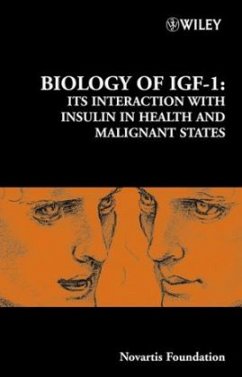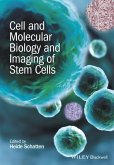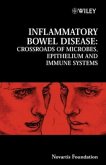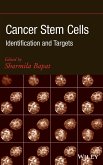An invaluable book containing a series of interdisciplinary discussions between clinical and basic scientists. Biology of IGF-1: Its interaction with insulin and health and malignant states focuses on key issues such as:
* the definition of danger zones
* the development of methods for early recognition of malignant states linked to IGF-1 and/or insulin
* possible approaches to preventative intervention
* the relevance in this field of research to the development of novel therapeutic approaches to treating certain cancers.
AUS DEM INHALT:
Chair's Introduction (Leroith).
Circulating IGF-I and its role in cancer: lessons from the IGF-1 gene-deletion (LID) mouse (Yakar et al).
Physiology of the IGF system (Holly).
Molecular basis of insulin action (Zick).
IGF-1 and insulin as growth hormones (Laron).
Insulin-like growth factors and neoplasia (Pollak).
Loss of IGF2 imprinting: mechanisms and consequences (Ohlsson).
Insulin and IGF-1 receptor trafficking and sginalling (Foti et al).
The mTOR/S6K signalling pathway: the role of the TSC1/2 tumour suppressor complex and the proto-oncogene Rheb (Nobukini and Thomas).
Structural biology of insulin and IGF-1 receptors (De Meyts et al).
Genetic blockade of the insulin-like growth factor-I receptor for human malignancy (Adachi et al).
IGF-1 and prostate cancer (Roberts Jr.).
IGF-1 and breast cancer (Lonning and Helle).
IGFBPs and cancer (Fang et al).
The IGF receptor as anti-cancer treatment target (Macaulay).
Nutrition, insulin, IGF-1 metabolism and cancer risk: a summary of epidemiological evidence (Kaaks).
Final discussion.
Index of contributors.
Subject index.
* the definition of danger zones
* the development of methods for early recognition of malignant states linked to IGF-1 and/or insulin
* possible approaches to preventative intervention
* the relevance in this field of research to the development of novel therapeutic approaches to treating certain cancers.
AUS DEM INHALT:
Chair's Introduction (Leroith).
Circulating IGF-I and its role in cancer: lessons from the IGF-1 gene-deletion (LID) mouse (Yakar et al).
Physiology of the IGF system (Holly).
Molecular basis of insulin action (Zick).
IGF-1 and insulin as growth hormones (Laron).
Insulin-like growth factors and neoplasia (Pollak).
Loss of IGF2 imprinting: mechanisms and consequences (Ohlsson).
Insulin and IGF-1 receptor trafficking and sginalling (Foti et al).
The mTOR/S6K signalling pathway: the role of the TSC1/2 tumour suppressor complex and the proto-oncogene Rheb (Nobukini and Thomas).
Structural biology of insulin and IGF-1 receptors (De Meyts et al).
Genetic blockade of the insulin-like growth factor-I receptor for human malignancy (Adachi et al).
IGF-1 and prostate cancer (Roberts Jr.).
IGF-1 and breast cancer (Lonning and Helle).
IGFBPs and cancer (Fang et al).
The IGF receptor as anti-cancer treatment target (Macaulay).
Nutrition, insulin, IGF-1 metabolism and cancer risk: a summary of epidemiological evidence (Kaaks).
Final discussion.
Index of contributors.
Subject index.








